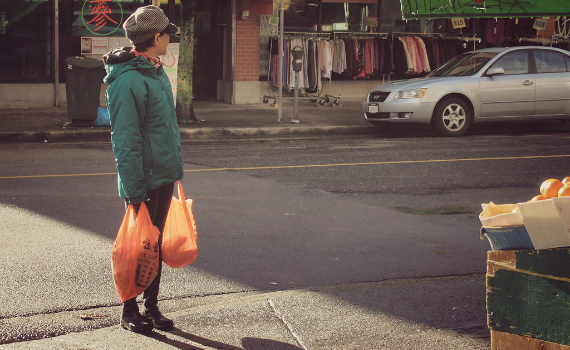Last year, I was in Cameroon (central Africa) for a series of seminars on entrepreneurship and small business.
While in Yaounde -- the capital city -- my host and I made a quick stop at a boulangerie (bread and snack shop). I had bought a few snacks and was quite shocked to realize I'd been charged for the plastic shopping bag!
Seriously? In my country, Nigeria, shopping bags are free! Plastic shopping bags are usually a complementary item you get from every shop, vendor, pharmacy or grocery you buy stuff from. But there I was in Yaounde, ready to pay 100 CFA Francs (about 10 US cents) for a plastic shopping bag that's supposed to be free -- at least, to my mind.
You see, while plastic shopping bags are popular around the world as a cheap and effective means of transporting small items, my findings reveal - quite surprisingly - that Africa is making more progress than others in getting rid of plastic shopping bags, and replacing them with more sustainable and environment-friendly alternatives.
More African countries are banning plastic shopping bags
Over 15 African countries have either banned or taxed the use of plastic shopping bags.
Rwanda was one of the first countries in the world to ban plastic shopping bags. In 2004, Rwanda prohibited shops from giving away plastic bags to their customers. The Rwandan government introduced tax breaks that encourage companies to recycle, instead of manufacture, plastic bags -- thereby creating a totally new market for environment-friendly bags.
Eritrea banned the use of plastic bags in 2005.
Tanzania introduced a nationwide ban on plastic bags in 2006.
In 2007, Uganda introduced legislation to ban the sale of lightweight plastic bags under 30µm thick and taxes thicker bags at a punitive rate of 120 percent.
Botswana introduced a levy on plastic bags that became effective in 2007. This led to many retailers charging a fee for plastic bags, further discouraging consumers from using them.
In January 2011, Kenya banned the manufacture and import of plastic bags.
In 2013, Mauritania banned the use, manufacture, and import of plastic bags. In that country, plastic bag manufacturers could be jailed for up to a year.
In South Africa, lightweight plastic bags are banned and thicker plastic bags are taxed.
In April 2015, Senegal's National Assembly unanimously prohibited the production, importation, possession and use of plastic shopping bags.
Cameroon, Guinea-Bissau, Mali, Ethiopia and Malawi are other African countries that have limited the use, adopted or announced bans on the use of plastic shopping bags.
Alas, the developed world is learning from Africa
While several African countries started banning plastic bags over a decade ago, Europe and North America have only just started making serious moves to ban and reduce the use of plastic shopping bags.
France
In May 2015, the National Assembly of France approved a bill that would ban plastic bags in all supermarkets and stores, starting from January 1, 2016.
The European Union
In April 2015, The European Parliament approved rules to clamp down on the use of flimsy plastic bags, removing the last major hurdle to pass the legislation. It would require member states to reduce the use of plastic shopping bags by some 80 percent by 2025.
The United States
The U.S. is seeing most bans imposed on local levels, by cities and counties. Over 100 counties and municipalities have enacted ordinances either imposing a fee on plastic bags or banning them outright. The State of California passed a law prohibiting their use in September 2014.
Why are plastic shopping bags a threat to Africa, and the world?
For decades, shoppers and businesses have relied on lightweight plastic bags as a strong, cheap, and effective means of transporting items. However, this popular item actually does more harm than good to humans and the environment.
Here are some of the biggest reasons why countries around the world should be more serious about putting an end to the production and use of plastic nylon bags.
Long-term pollution
Plastic shopping bags are made from high-density polyethylene (HDPE) plastic. Because this substance does not biodegrade, plastic bags can last up to 1,000 years in the environment as garbage. Apart from the eyesore that waste plastic bags are, they are a common cause of clogged drainage systems, sewers, and waterways. In many cities around the world - especially in developing countries - clogged drains are major breeding grounds for mosquitoes which cause malaria; a disease that killed over half a million people last year.
Threat to livestock and wildlife
According to the World Wide Fund for Nature, over 100,000 whales, seals, and turtles die every year as a result of eating, or getting trapped by, waste plastic bags which find their way to the open seas and oceans. In Mauritania (North Africa), more than 70 percent of cattle and sheep that die in the capital city, Nouakchott, die from eating plastic bags. This type of economic loss is common in many parts of Africa where livestock often graze in areas with significant waste plastic bags.
Strong climate change impacts
Plastic bags are made from derivatives of petroleum. As you know, petroleum-related activities are a major contributor of carbon emissions which harm the environment and continue to have global climate change impacts. If the world's demand for plastic shopping bags continues to increase, it will surely have a direct effect on the production and demand for petroleum now and in the future. This, of course, is bad news for the world's climate.
Are you ready for the end of plastic shopping bags?
If we really care about the earth, it's high time we started breaking our attachment to plastic shopping bags. In parts of Africa where they have been banned, shopping bags made from paper, cloth, jute, and raffia have turned out to be excellent 'earth-friendly' alternatives.
Are you ready to make this change to save the earth?
